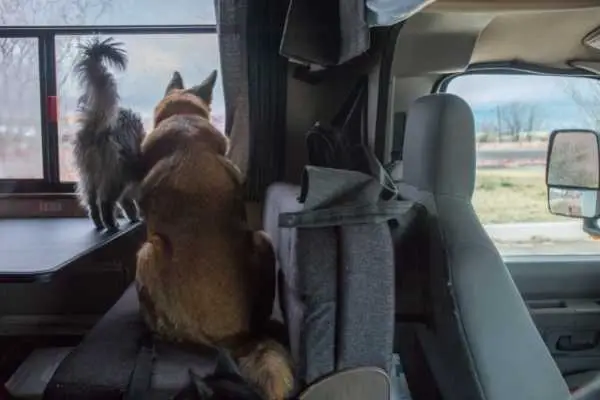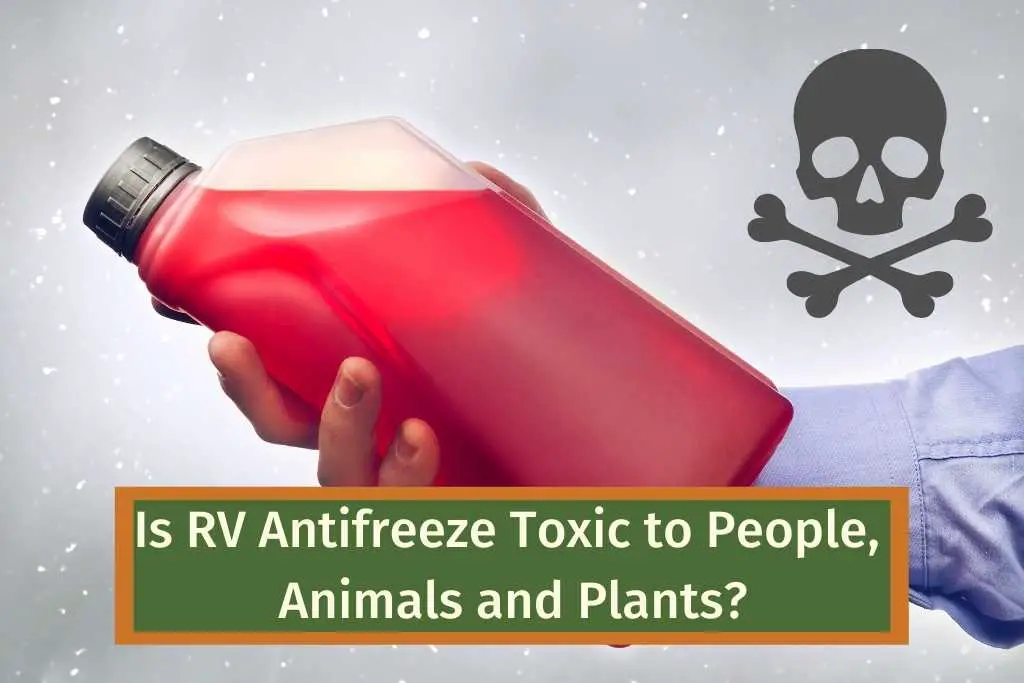In this article, we’ll answer – is RV antifreeze is toxic to people, animals, and plants? We will also discuss how to safely dispose of RV antifreeze so it doesn’t cause any harm.
If you like RVing and camping then the chances are you’re a nature lover and environmentally friendly too. So, you’ve probably asked yourself, is RV antifreeze toxic?
Is RV Antifreeze Toxic to People?
There are two main types of RV antifreeze, both are dyed pink and are not toxic to people. One has the active ingredient of ethanol and the other is propylene glycol, both are types of alcohol.
Both active ingredients will increase the freezing temperature of water to stop your pipes from freezing.
As RV antifreeze has the active ingredient of alcohol in both scenarios it is not toxic to humans. However, that only applies to very small quantities.
Because it is not toxic to people it is safe to use in your RV water system to prevent freezing pipes.
If you do use RV antifreeze to winterize your water system, make sure to rinse it out thoroughly before you use it again. Because it’s non-toxic you don’t have to worry about ingesting small quantities.
It’s very important not to get RV antifreeze confused with car antifreeze as car antifreeze is toxic and should not be used in your RV.
Is RV Antifreeze Safe to drink?
Although RV antifreeze is non-toxic to humans, that’s only in very small quantities. RV antifreeze is not safe to drink, and should not be swallowed directly from the bottle or in large quantities. Why would you want to drink RV antifreeze anyway?
So, now we have established that RV antifreeze is not safe to drink. What is meant by non-toxic?
The term non-toxic means “not poisonous or not containing poisonous substances”, and so whilst RV antifreeze is not poisonous it can still be harmful if consumed in large quantities. If you have rinsed out your drinking water pipes thoroughly after using RV antifreeze then it’s perfectly safe to drink from the faucet.
Ingesting the residue when diluted down is safe for you and your family. That’s why RV antifreeze exists!
Make sure that you read the label carefully before using it in your system to make sure that you are putting non-toxic RV antifreeze into your system.

Is RV Antifreeze Toxic to Animals?
Technically RV Antifreeze is non-toxic to animals, but like with people it only applies if it’s ingested in small quantities. For animals, the quantity of RV antifreeze that is safe to digest is even smaller.
Unfortunately, RV antifreeze has a sweet taste that can attract your dog or cat to it. This poses a threat to your pet (or other animals) if too much is ingested.
If you think your pet has ingested RV antifreeze then monitor them closely and watch out for the following signs of toxicity:
- Depression
- Weakness
- Involuntary muscle movements
- Increased urination
- Increased thirst
- Low blood pressure
- Cardiovascular collapse
- Seizures
Toxic consumption: In dogs, 9 mL/kg (4.1 mL/lb) can be fatal. There is no established toxic threshold in cats. [1]
Cats are especially susceptible to RV antifreeze and will be drawn to the sweet taste, and unfortunately, cats are more prone to illness from ingesting it. RV antifreeze can cause Heinz body hemolytic anemia, which deforms the hemoglobin in the blood [2] which is a serious problem.
If you are a cat owner or go RVing with your cat then it’s probably best to stay away from any kind of antifreeze and winterize your RV by flushing out the water from the system completely.
Like with people the residue that’s left in the RV water system after you have winterized and flushed the pipes will be fine for animals.
In short RV antifreeze is not toxic to animals if taken in very small doses, if an animal drinks straight from the bottle or more than a teaspoon of concentrated RV antifreeze then it can be toxic.
If you think an animal has ingested any amount of RV antifreeze then report it to your vet and they will be able to advise you further. They will also be able to analyze the bloods and issue fluids to try and flush the RV antifreeze out of your pet’s system.
Is RV Antifreeze Toxic to Plants?
Like with animals and people RV antifreeze is safe for plants in small quantities and diluted down. If you empty your RVs system onto plants and grass then this can change the soil nutrients and ultimately kill the grass of plants nearby.
If you have a small amount to dispose of then you can dilute the RV antifreeze down with water and pour this onto the ground. But if you are emptying your winterized tanks then it will be safer for the environment to dispose of the contents at a facility that accepts RV antifreeze.
How Do You Dispose Of RV Antifreeze?
RV antifreeze should never be dumped on the ground in large quantities, even though it is non-toxic it does contain chemicals that are harmful to the environment.
RV antifreeze is dangerous to plants and grass as it contains heavy metals which can kill plants. There should be instructions on the packaging that tells you how to safely dispose of RV antifreeze.
If you do dump large amounts of RV antifreeze on the ground you could face legal repercussions, different authorities have different rules on the disposal of RV antifreeze. Make sure you check the governmental guidelines for where you are and how to safely dispose of RV antifreeze.
It’s also not recommended to throw RV antifreeze down the drain, as this can end up coming out of storm drains where animals can have access.
You can safely dispose of RV antifreeze by:
- Reuse. If you are running RV antifreeze through an empty plumbing system, you can simply catch it in a bucket when you drain it to use again next year. Will save you a couple of dollars too.
- Recycle. There are a growing number of companies that will recycle your RV antifreeze, have a look on your local waste management website for more information.
- Dispose at a facility. RV service stations and stores can dispose of the antifreeze for you, they may charge a fee for the privilege though.

